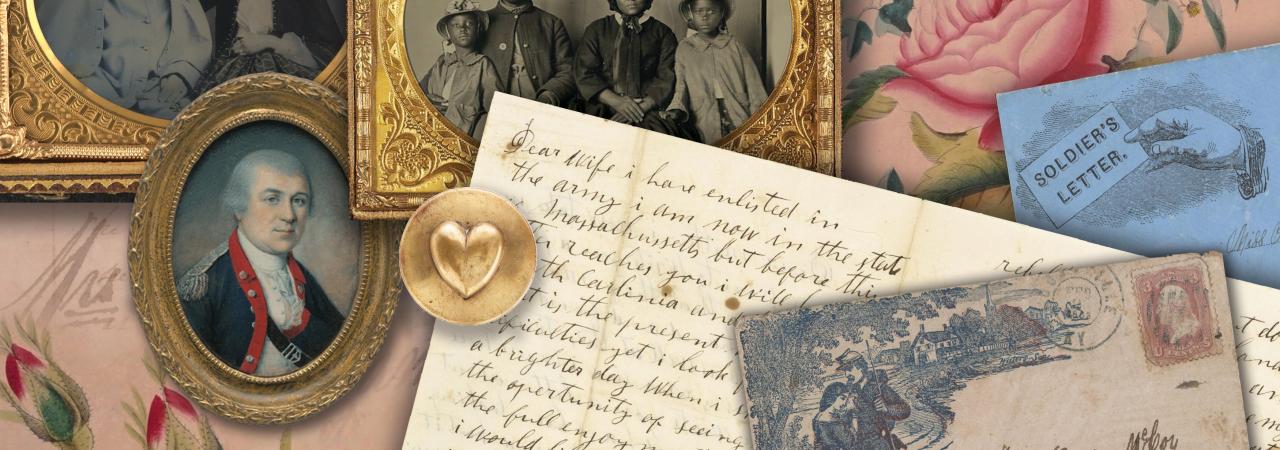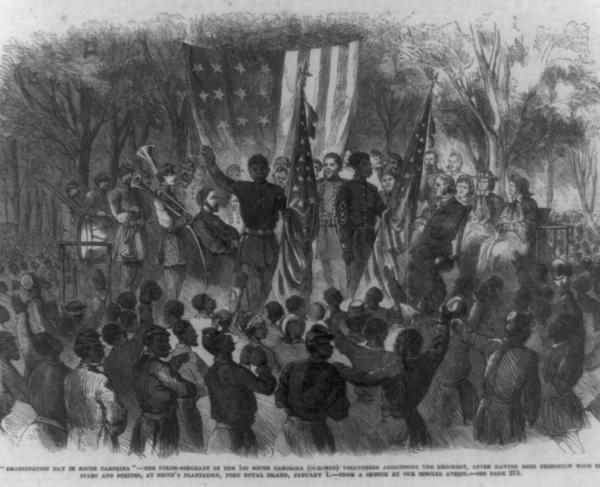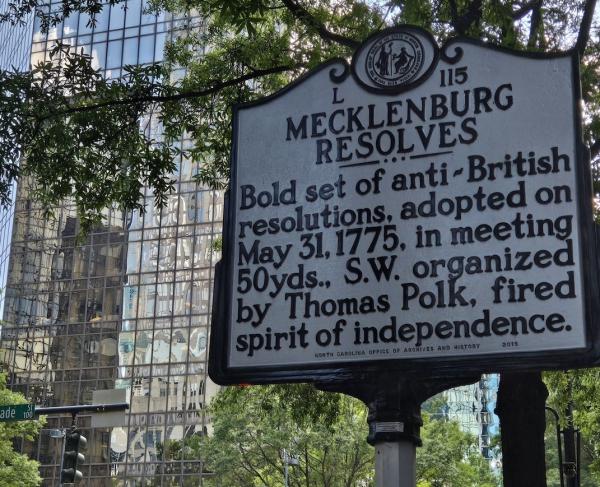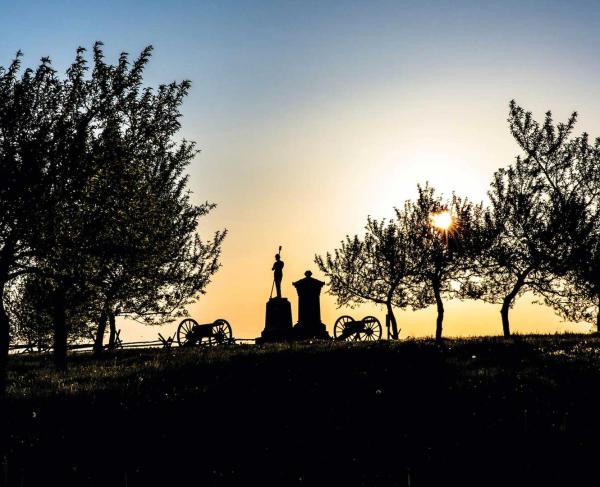
There are few things as difficult to navigate as the game of love. Finding that missing puzzle piece of a person who celebrates your successes, comforts you during your lows, and smiles because you smile... well, that’s tricky enough! But what happens when war drives a wedge between you and your other half?
From those who had the weight of a new nation on their shoulders to those whose potential in-laws supported the opposing side to those who sought out freedom – not only for themselves, but their loved ones left behind – love was another battlefield on which they fought. For many in the field, loved ones gave them a heightened sense of purpose and support, others felt guilt in leaving behind a long list of responsibilities at home, and some felt the sting of disapproval and loneliness caused by their uncompromising definition of duty. These emotions, and several others, were carefully penned across pages and pages of letters.
And this is what leads me to introduce you to a variety of sources, composed by legendary figures, everyday people, and those seeking liberation.
“I retain an unalterable affection for you, which neither time or distance can change...”
George and Martha, Revolutionary War
George Washington is often thought of as a stoic leader... one who was cool, calm and collected in the heated moments of our nation’s formation – certainly not a man who wore his heart on his sleeve! But, he had a soft spot for his darling wife, Martha. In one of the few remaining sources that shed light on their relationship, a love letter written by the Continental Army’s Commander-in-Chief — minutes before departing Philadelphia in late June 1775 — shows a vulnerable Washington as he expresses trust in his faith and his “unalterable affection” for his “worthy partner.” Only days after being named Commander-in-Chief, George Washington had immense pressure upon him and knew the revolutionary road ahead was laced with uncertainty. So, what better time to candidly relay his feelings to Martha than that moment? Perhaps the vulnerability expressed in this letter struck a chord in Martha, as it is one of only three that remained after she destroyed nearly all of her and her husband’s communications after his passing in 1799.
Phila. June 23d 1775.
My dearest,
As I am within a few Minutes of leaving this City, I could not think of departing from it without dropping you a line; especially as I do not know whether it may be in my power to write again till I get to the Camp at Boston—I go fully trusting in that Providence, which has been more bountiful to me than I deserve, & in full confidence of a happy meeting with you sometime in the Fall—I have not time to add more, as I am surrounded with Company to take leave of me—I retain an unalterable affection for you, which neither time or distance can change, my best love to Jack & Nelly, & regard for the rest of the Family concludes me with the utmost truth & sincerity.
Your entire,
Go: Washington
“...a heart wholly absorbed in love and anxiety for you...”
Henry and Lucy, Revolutionary War
A Boston bookseller turned Patriot/Continental general, Henry Knox remained resolute in his affections for Lucy Flucker despite her well-to-do family’s loyalist standing. With Lucy’s father — Thomas Flucker —as the third highest ranking British official in Massachusetts, they first kept their romance on the down-low by way of coffee shop encounters, book exchanges and, eventually, heartfelt love letters. And almost as if influenced by Romeo and Juliet, the two married in June 1774, a union of genuine love regarded as an act of defiance in the eyes of Lucy’s family.
After the Revolution’s first shots rang out in the Battles of Lexington and Concord, the couple found themselves parting with Boston —and Lucy forever parting with her family. Henry enlisted in the Continental Army and rose to be one of General Washington’s most trusted subordinates. Over the course of his triumphs and defeats, Lucy was constantly on his mind... and their love is evident through the trail of letters they left behind.
Writing to his beloved on the day following the Battle of Brooklyn, Henry emphasized the fleeting nature of time and his want to make the most of it — by writing to “my Lucy.” He gives her insight on the dreary circumstances surrounding their strategy in New York and makes no haste in ensuring her that the war is a pathway to peace, one which will result in their lives lived felicitously side-by-side...
New York Augt 28 1776 9 oClockeveg -
My dearest Lucy
The post is not come in so I shall not have the happiness to answer any Letter which I may receive from you - my time is so precarious That I must embrace every opportunity, my Lucy has heard the account of the Action of yesterday, and that I dare say in a way which has alarm'd her.
…
It is not certain what is become of General Sullivan and Lord Stirling but it is suppos'd they are kill'd I have my dearest friend in grateful remembrance your kind Letter of last Thursday, and dare say I shall receive no small additional happiness from the perusal of yours of tomorrow - dear Girl how much I love you, War will bring peace and bye & bye we will live together enjoying the felicity & happiness of each others society 'till time [text loss] Walk us to immortal happiness, kiss my babe for me - & Beleive me to possess a sincere affection for you as it is possible for a mortal to do
HKnox
The educated Lucy did not defer from discussing affairs of state with her husband, but she was no stoic who spoke in pure facts – she expressed her anxiety not only for her husband and the Continental forces, but also anxiety rooted in the pressures of home life. These sentiments can be gleamed from the following excerpt of her May 1777 letter...
As I can think of no address which would convey an idea of my affection and esteem, I will omit intirely, rather than do injustice to my heart, a heart wholy absorbed in love and anxiety for you – I cannot at this time tell where you are nor form any judgment where you are going – we hear both Armys are in motion, but what thier rout is, we cannot hear. nor have we yet been able to conjecture – what a situation, for us who are at such a distance – how much more we suffer for you than you for yourselves – all my hopes are that it will not, cannot last . . .
Read the entirety of this letter here.
“...I commit you to the ruler of all the earth whom trust will keep us from all danger and bring us together again...”
John and Eleanor, War of 1812
Only a short while after moving his young family to territory in what would become the state of Ohio, John Holliday saw that “Mr. Madison’s War” was dragging on and the need for more troops was obvious. And so, leaving behind his wife, Eleanor, and son, Wilson, he enlisted in the spring of 1813. In a letter sent mere months after joining up, John wrote to his strong spouse from the frigid barracks of Fort Stephenson, on the Sandusky River,unleashing details of the dreary state of affairs, fond appreciation of her hard work at home, and wishes for reuniting.
Little did he know, the fort would repel a bold British attack two months after writing his letter. And a year later, the Brits upped the ante when they flooded the fledgling capital of Washington in a sea of flames.
May the 27th 1813
Fort Stephens Lore Sandusky
Affectionate Companion: I received your letter this morning of the 23rd instent Which gave me a grate deal of satisfaction to hear that you are well and that Wilson is a good boy
It gives me a great deal of satisfaction to hear that the corn is planted and that you expect it will be tended for I did not look for that to be done
...
I would be desireous to get home but I cant any way to get to without doing as them that has gon and I think it is best to stay to such time as I can go home in safety and with some honor as I cant think to lose my time for nothing and be farther back than when I started
I have nothing of importance to write to you I comit you to the ruler of all the earth whom trus will keep us from all danger and bring us together again to injoyeach others company which will be a very desireable time to us I trust
Remember me to my frends and to all that may think fit to inquire after me nothing more at present but remaine your affectionate husband till death
John Hollyday
“A heart so true as yours, could not possibly hold sentiments other than patriotic.”
Madison and Lizzie, Civil War
A Union soldier since the Civil War’s inaugural year, Madison Bowler was determined to see the conflict through, although his heart strings were constantly tugged upon by the pull of his missus back in Minnesota, Lizzie. Correspondence from early in the war reveals an optimistic Lizzie — one that sees purpose in her sweetheart-turned-husband’s soldiering (the two would marry in November 1862), grand visions of their family to come, and a hope for her other half’s heightened spirits. But hordes of time apart can alter emotions. She became doubtful of his devotion to family, as Madison time and time again choose duty to the nation, leaving Lizzie to raise their young family alone. In their later letters, Lizzie expressed this doubt and, in doing so, caused the couple to debate their interpretations of patriotism. And despite Lizzie’s war-weary heart, Madison never stopped voicing his trust in the Union cause and wanted to instill that same certainty within Lizzie.
NININGER, MINN., NOVEMBER 2, 1861
Saturday Evening
Dearest loved one
…You ask to be forgiven if you have ever done anything unkind. There is nothing to forgive. You have always been to me all and more then I expected, you have shown acts of kindness both to me and others that you shall be remembered for as long as earth gives me a home. I hope that some day I shall be able to return them by kind word and loving acts. When you go down river, I want, if it is not too much trouble, you to keep a journal so that when you come back if you ever should, while trotting your grandchildren on your knee, you can look over the time when you were a soldier. I don’t want you to have the blues any more. If you do what you think is your duty both to God and man, you can do no more….
Yours ever Lizzie
Come down if you can any way…
LITTLE ROCK, OCTOBER 26, 1864
My Patriotic Wife:
Yours of Oct. 8th I received to-day. You sign yourself as my “unpatriotic wife.” I object to that in toto. I never intended to intimate that you were unpatriotic—I never thought so, even. A heart so true as yours, could not possibly hold sentiments other than patriotic. I only wished you to be less doubting, more encouraged in regard to our cause. In the army, courage, confidence, and hope prevail; while at the north are found many grumblers and traitors; also many who are easily discouraged and who permit themselves to make discouraging expressions…I thought by the tone of one of your letters that you felt discouraged. I want you to be full of hope and confidence as long as we have a cause to fight for….
Ever your Madison
Read more correspondence from Madison and Lizzie here.
“... i look forward to a brighter day When i shall have the opertunity of seeing you in the full enjoyment of fredom...”
Samuel and Leah, Civil War
Twenty-one-year-old Samuel Cabble saw the promise of freedom when he enlisted in the Union army, in which he would go on to serve as a private in the 55th Massachusetts Infantry, the second African American regiment raised in that state. But, while he sought out this channel to liberty, he had left loved ones behind in Missouri — still entangled in the ugly institution of slavery. Bringing his truths to surface, Samuel wrote to his wife, Leah. In his letter, he not only delivers news of his enlistment and whereabouts, but his concern for her current state – and his belief that “it will not be long before we shall have crushed the system that now opreses [oppresses] you.” He expresses pride in being a soldier, uplifted by the goal to trample the curse that kept so many in chains.
However, his letter would never reach Leah, as it was confiscated by his former owner, Robert Cabble, who used the correspondence to apply for compensation from the Union. Still, Samuel marched on with the 55th Massachusetts, serving for three years before mustering out in August 1865. Upon his return to Missouri, Samuel’s heart was made full when he reunited with his lovely Leah. They basked in “the full enjoyment of [freedom],” as they proceeded in their new lives by legally marrying, having a son, and venturing west to Denver, Colorado.
[Approx. 1863]
Dear Wife i have enlisted in the army i am now in the state of Massachusetts but before this letter reaches you i will be in North Carlinia and though great is the present national dificulties yet i look forward to a brighter day When i shall have the opertunity of seeing you in the full enjoyment of freedom i would like to no if you are still in slavery if you are it will not be long before we shall have crushed the system that now opreses you for in the course of three months you shall have your liberty. great is the outpouring of the colered peopl that is now rallying with the hearts of lions against that very curse that has seperated you an me yet we shall meet again and oh what a happy time that will be when this ungodly rebellion shall be put down and the curses of our land is trampled under our feet i am a soldier now and i shall use my utmost endeavor to strike at the rebellion and the heart of this system that so long has kept us in chains . . . remain your own afectionate husband until death—Samuel Cabble
Learn more about the USCTs here.
Military couples of today continue to exchange heartfelt communications, although modern technology has expanded the ways in which these words are traded – even bringing loved ones face-to-face with video chats. And while the military has also experienced extensive transformation since the Civil War, certain elements of military relationships are timeless. The strain between duty to nation and duty to loved ones is a continuous thread woven into this topic, as many struggle to suppress the fear of sending their other half into battle, while others fight through the pain of leaving their other half at home whilst diving into uncertain circumstances.
But love also has the power to get one through the most difficult of times. Members of the military have a duty to their nation — but they are often fueled by the purpose imparted to them by those who make their hearts whole. While love may be a battlefield, history continuously proves that love is also one of the mightiest weapons one may unsheathe.


